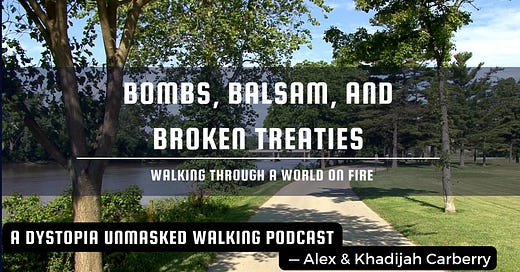What do a 200-plane Israeli air raid, a collapsing rules-based order, and an invasive flower along an English riverbank have in common?
In this walking conversation, we trace the shadowy contours of a world shifting beneath our feet. Israel’s bombing of Iran is framed as “self-defence,” while Iran’s retaliation is branded “aggression.”
Meanwhile, the world’s naval powers look on—or quietly enable. But what really makes such an attack possible? And what does it mean to read war through the waterways, the treaties, and the silences in between?
We explore the geopolitical circuitry that links airspace permissions, sabotage, and Western complicity to the broader collapse of the rules-based order. From Gaza’s blackout to the Himalayan Balsam choking our riverbanks, this episode asks what happens when empires lose control of the systems they’ve built—and still cling to dominance through deterrence and denial.
Note: In discussing regional actors like Russia and Turkey, we recognise that our assumption—that they did not contact Iran before the attack—may be incorrect. We acknowledge that contact may have occurred and that sabotage on the ground may explain why Iran’s layered air defences, though likely on alert, still failed to function as expected.
This is not just a breakdown of current events—it’s a walk into the deep waters of micropolitics, empire, ecological metaphor, and strategic symbolism.
Join us as we wander through war, language, and landscape—searching for the truths buried between bombs and blossoms.
To support Gaza with E-sims CLICK HERE
Disclaimer: For Educational and Analytical Purposes
This content is intended solely for educational, analytical, and critical reflection. All views expressed are those of the speakers and authors and do not constitute endorsement or incitement of violence, hate, or unlawful activity.
The material engages with geopolitics, symbolic power, and ecological metaphor through a lens of decolonial inquiry and public critique. References to states, events, or actors are based on publicly available information and are presented as interpretive analysis within the protected domains of academic freedom and free expression.
Terms such as “genocide,” “imperialism,” or “military aggression” are used in alignment with scholarly and humanitarian frameworks. The term genocide in particular is used with reference to International Criminal Court (ICC) standards. The authors do not advocate for any political faction or resistance group.
This content complies, to the best of our knowledge, with the Terms of Use of all platforms on which it is published.














Share this post